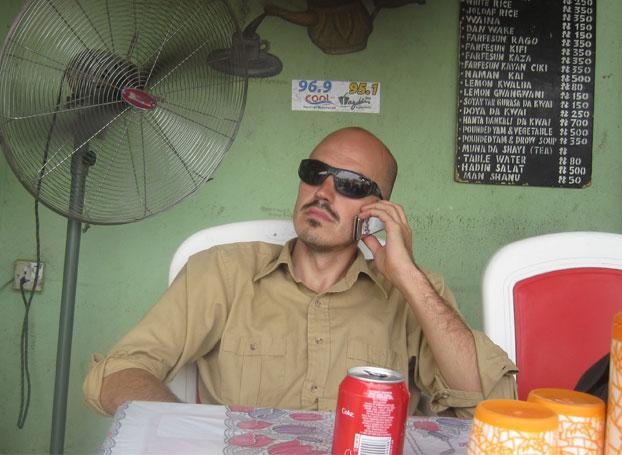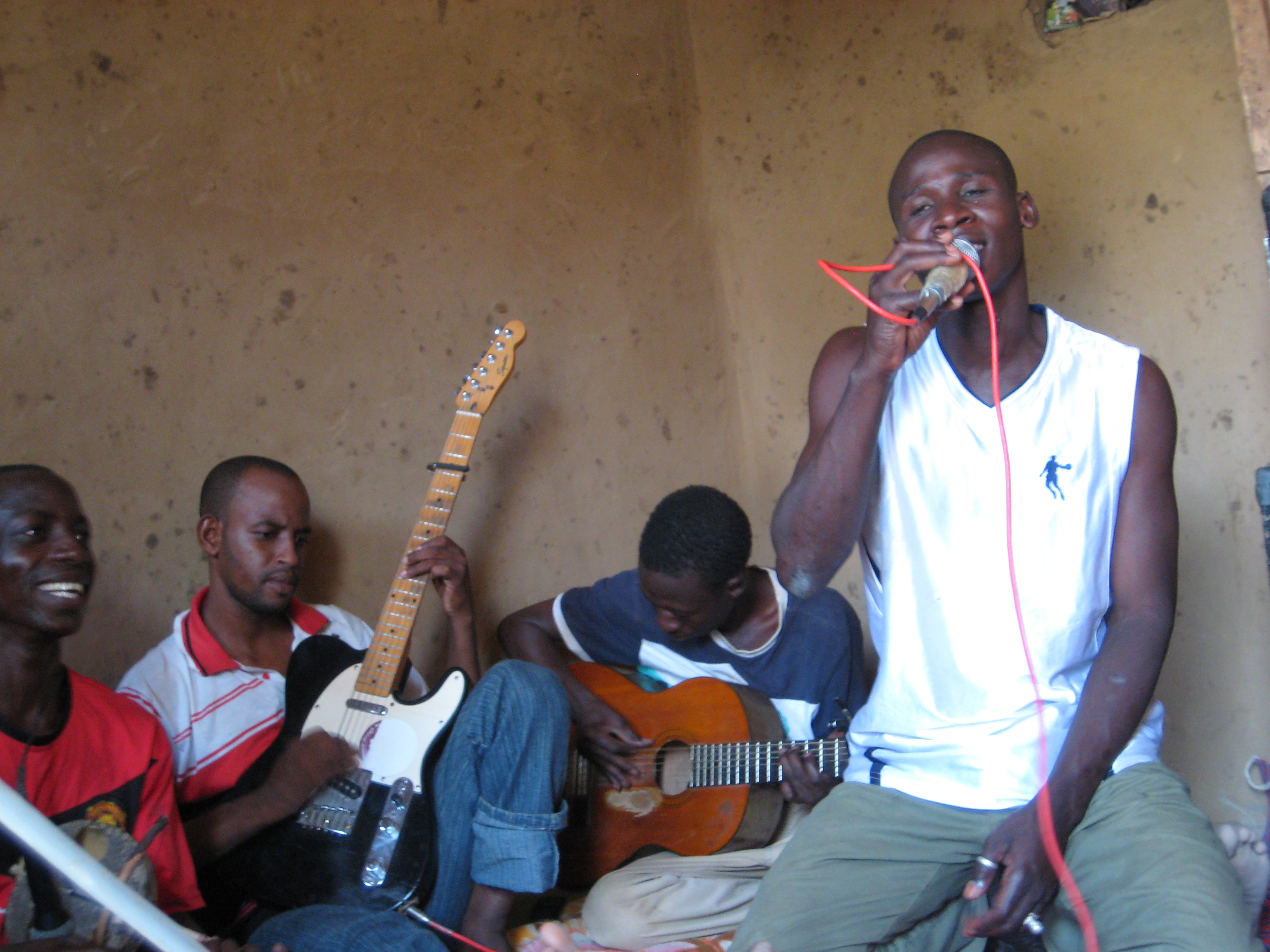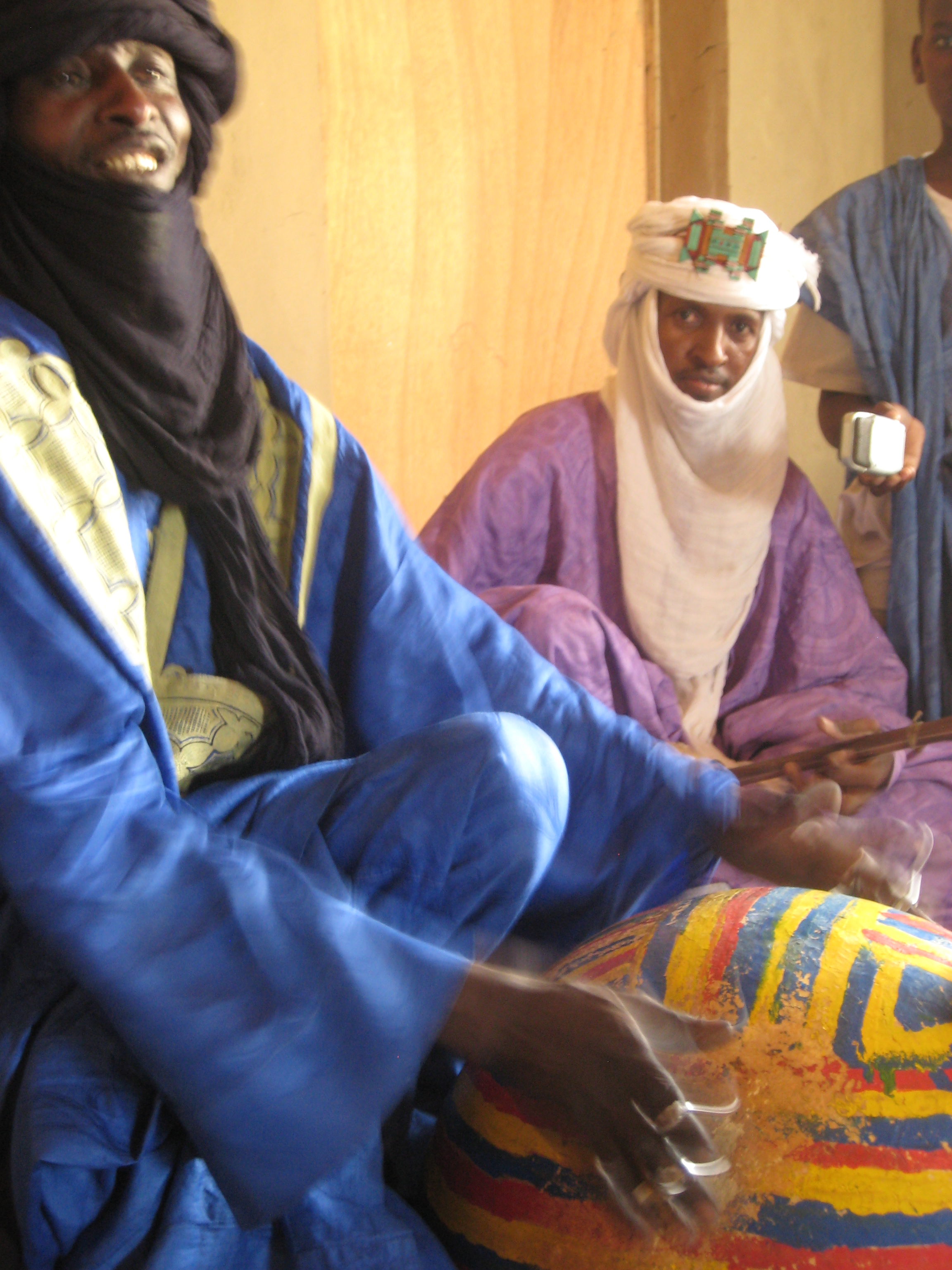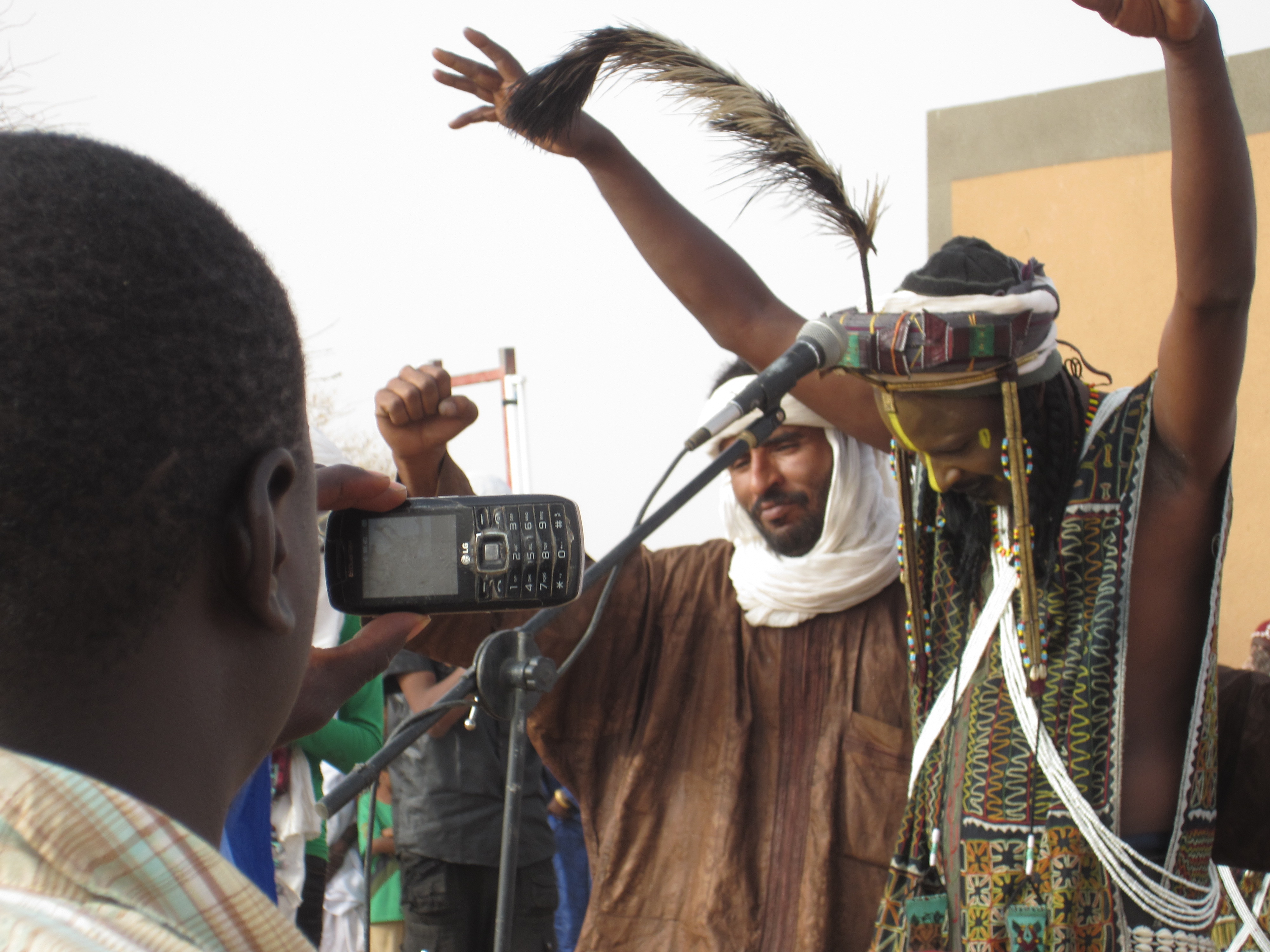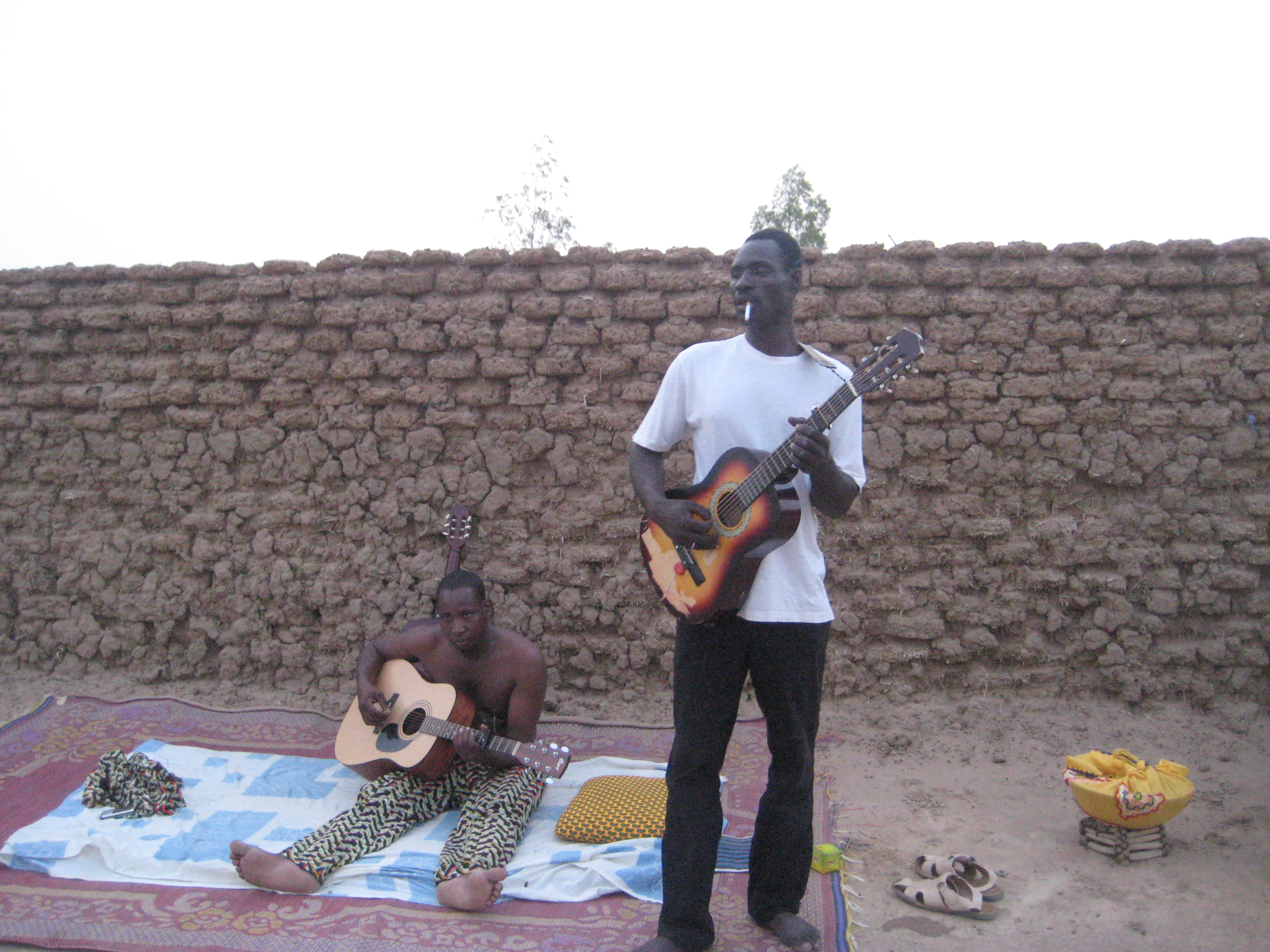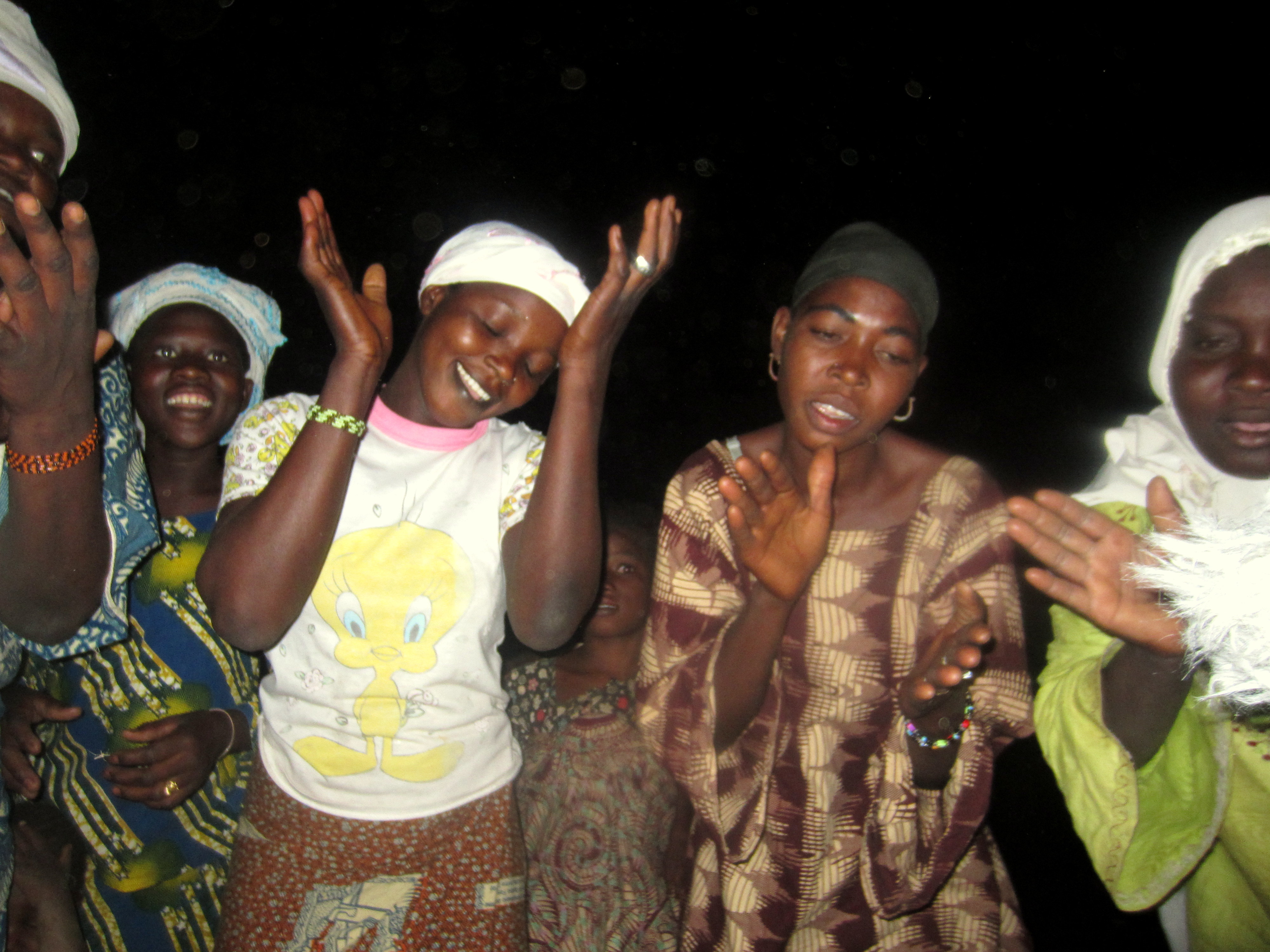In our program "Sahel Sounds: New Music from Mali," Afropop worked closely with Christopher Kirkley, the owner of the Sahel Sounds label to explore the exciting world of electronic pop music in Mali. In the process, we got a chance to sit down with Christopher, and ask him about his experiences.
Sam Backer: Introduce yourself for us.
Christopher Kirkley: My name is Christopher Kirkley and I run the Sahel Sounds blog and record label focused on music and cultural phenomenon in the West African Sahel. Over the past three or four years now, I've been working in Mali and the surrounding countries recording music and working with artists to produce their music here in the U.S.
SB: How did you first get involved in working in West Africa?
CK: I first got involved in traveling to West Africa in 2010 when I went there on a recording project with a little zoom recorder... Just hitting the road and traveling around with the idea of making field recordings and finding out what music was like in that part of the world. I first traveled to Mali in 2009-2010, and I spent about a year and a half living in Mali, in Mauritania, and I've since gone back about every year.
SB: Can you tell us about your label?
CK: The label is called Sahel Sounds. It started as a blog. While I was traveling and recording music, I wanted a place to share it with people so that once I made a field recording I could put it online and write about the music. A few years later, it became a record label. I teamed up with Portland, Mississippi Records and we started doing vinyl releases of the recordings I made, in addition to working with current artists and vinyl releases of various pop music. The effort of the label is to capture what is happening on the ground in Mali, or in West Africa, right now, and to showcase some of pop music that people are currently listening to.
SB: Do you think that's something that is necessary?
CK: Yeah, I think so. I think that in the world music scene, there is kind of a disparity: A lot of the world music that we hear right now in America or in the West is not really representative of what people are listening to in West Africa. Maybe that's the same everywhere--that the stuff that people are listening to on the ground is music that they want to hear and not music that labels in the West are interested in selling.
One of the most obvious differences I can think of is hip-hop in West Africa. We don't hear too much for that, and we don't think of hip-hop when we think of West African, or Malian, music, but there's a huge hip-hop scene in Bamako and it's pretty much the music that kids listen to nowadays.
SB: The label first came to a lot of people's attention through the Music From Saharan Cellphones compilations. Can you tell us about those records?
CK: The Music from Saharan Cellphones compilation was this idea that I had when I was doing field recordings. I noticed that there was a lot of other music that people were listening to on their cellphones. West African people use their cellphones like people use their iPods, or iPhones, or iTunes--it's a way to store and trade your digital MP3s. I noticed that people were listening on their phones to stuff that I had never heard before--crazy stuff, with drum machines, Autotune... All this really contemporary music that I couldn't find anything about. You couldn't Google it--it didn't exist on the Internet. Sometimes people didn't know who the composers were on the music, they just had these unidentified MP3s on their phones. So I started collecting MP3s from people's cellphones and I brought that back to the states. Over the next couple years, I worked on tracking down a some of my favorite tracks that I collected, finding out who made those songs, contacting them, licensing them, and putting together a compilation.
SB: Cellphones work somewhat differently in western Africa. How does that impact the music?
CK: The cellphones that people are using in West Africa have this Bluetooth capability so you can send a file from phone to phone with a file transfer. If you hold up the phones next to each other, you can send a file from one to another.
Music is shared from phone to phone. So if you hold up your phone to another phone, you just hit send, and you can trade and share these files. So there's this culture of file sharing now, where if a bunch of kids are sitting around and playing music on their phones and one of the songs elicits interest, you can pretty quickly say, "Hey, I like that song, can you send me that?" and with a few clicks on your phone, you've made a copy. It's created this huge network of file sharing across West Africa where people take songs from their friends, get on a bus, travel 10 hours, go to a new city, transfer a song again. And these songs can be shared without really any Internet; there's no central network that exists, just people moving with their cellphones.
SB: So that's mostly free sharing. But I also know that the phones have created MP3 markets.
CK: Yeah, one of the cool things that has popped up over the past few years is the MP3 market. So, while you can download music and copy music onto your phone from another phone, these Bluetooth wireless file transfers take a long time. So in order to fill this need for quicker file transfers, cellphone vendors have started selling music as well, pretty much in every cellphone market in Mali. In Bamako, downtown in the central market, there's a cellphone market. It's just alongside one of the main streets. There are vendors sitting under umbrellas with glass cases showing off their different cellphones for sale. But every vendor also has a laptop connected to a pair of speakers playing their latest music. And if you go up to these guys and ask them for the songs, you can buy the MP3s for a set price. You can choose the songs you'd like and they'll fill up your phone or USB key with the latest songs.
Needless to say, there's no money that's given back to the artist, so it's technically piracy, but none of the younger artists seem too concerned with this. In fact, a lot of younger artists--the rappers, for example, or the DJs--they'll actually go to the vendors with their new songs with the intention of utilizing them to distribute their music and make them popular, even going so far as to pay the MP3 vendors for promotion purposes.
SB: Are these kinds of markets mostly in the big cities? Or can you find them throughout Mali?
CK: You can find people selling MP3s everywhere from Kidel to Niafunké to Bamako, but the really big MP3 markets are in the capital cities, where you can see computers lined up one after another with a myriad of cables sprouting from them for plugging in different memory cards and USBs. There's this amazing competition of sound, of people blasting out the music from their computers.
SB: Can you buy all kinds of music at these markets? Or is it mostly youth music, or pop music?
CK: You can find all kinds of music at the MP3 market, but they really specialize in the youth music because it's really the youth who are utilizing the MP3 market. It's young people who are most connected to that culture of file sharing and cellphones.
SB: Another part of the youth culture that you've covered is Balani Show music. Can you tell us about that?
CK: Yeah! Balani Show music is really interesting because there are a lot of remixes, a lot of DJ remixes of different tracks, and there's a lot of crossover between Balani Show and hip-hop. To be real clear, we're talking about Balani Show as if it's a music, but Balani Show is really the name of the type of event--it's the name of a type of party. Balani Shows are these neighborhood block parties that happen in the residential neighborhoods of Mali--but particularly, in Bamako--where DJs organize sound system parties. They set up some speakers in the street, block off the street, put some chairs out. A couple DJs set up their laptops, and they'll play music for different events such as a baptism, a kid's birthday celebration, or some type of neighborhood party. The DJs are playing really contemporary pop music--stuff people want to dance to. It's sometimes called ambiance, or Balani, or hip-hop--but it's got to be music that makes people want to dance.
SB: I didn't realize the name came from the parties. What are they like? How are they organized?
CK: Balani Shows usually start out with all the neighborhood kids coming together. You'll have two MCs and a DJ, and the MCs will run around the crowd and organize the party--so they'll set up different games for the kids, and the kids will play musical chairs or they'll have mock fashion shows, or they'll call five kids at a time to come out and dance. But as the party goes later into the night, the older kids will come out--lots of teenagers, older teenagers, 18- and 19-year-olds--and these kids have dance crews, different dance groups, and they come out and do these choreographed dances. And they'll compete with one another, so there'll be one dance group competing with another dance group.
They get into pretty elaborate choreographed dance routines, sometimes even this acrobatic stuff where they'll pick each other up and throw each other in the air, or jump over each other. I saw one where these groups hold each other by the legs and spin, spin each other in the air. You have to step back a little bit so you don't get hit by one of them! It's sort of similar to break dancing in a way; there's a lot of pride, "This is my group, this is my crew, we're going to dance, and we're going to be the best dancers at the Balani Show."
SB: The shows are often organized by parents, right?
CK: Well, The cool thing about the Balani Show is that it really is about the kids, it's about the young people, but it's organized in the neighborhood right in front of someone's house. Part of the reason for the popularity of the Balani Shows is that it's a way for the parents to organize a party for their kids while keeping an eye on their kids, because they're right there, it's right in front of their house, and they can step out and check on their kids and see that they're not up to anything they don't approve of.
SB: The music played at these shows: A lot of it is connected to older musical traditions, right?
CK: Well, even the name itself, Balani Show, comes from the name Balani. Balani are balaphon parties. The balaphon is this wooden, percussive instrument... But Balani Show has its origins in these balaphon parties. They were these village parties where musicians would play percussion and balaphon and would call villagers together to have these parties where people would dance. Balani Show is sort of an extension of that; it's a traditional balaphon model adapted to the city. A lot of the DJs I talked to said that they started doing Balani show because people couldn't afford a balaphon player--paying all the musicians, paying for all the instruments, the different musicians to play the instruments; it's expensive! It's a lot cheaper to just find a DJ. So these DJs started to create this music that really recalled the balaphon, but they could make it on their computer. So using samplers, rhythm boxes, and then later computers, they started to compose these electronic versions of what balaphon music was. So, sort of this pounding dance rhythm, but sampling percussive elements of the balaphon and different Malian drums.
SB: How did you first encounter Balani Shows?
CK: Well, Balani Shows are really hard to miss. If you're in any neighborhood of Bamako walking around in the evening, particularly on the weekend, you're likely to see these things happening. And you'll just kind of stumble into them if you're walking around on the streets....and they're loud! They go until about midnight in these residential neighborhoods. So that's where I first encountered Balani Show, just walking around Bamako in the evening.
SB: Do you have a plan to release any of it?
CK: Yeah, I'm currently working on an album of Balani Show "super hits," some of the popular music that people are currently listening to at Balani Show.
SB: So, shifting focus north. You've done a lot of work with the band Alkibar Gignor. Can you tell us about them?
CK: Well, Alkibar Gignor is a band from Niafunké, Mali. It's a little town outside of Timbuktu. It's sort of a famous town; it's the home of Ali Farka Touré. Alkibar Gignor is a band created by Afel Bocoum. Afel is a former bandmate of Ali Farka Touré, but also a pretty renowned musician of his own who has formed his own group and toured a lot over the past 20 years. When Afel started touring, he wanted to create a band that could remain behind in Niafunké and play for the town. Alkibar is the group of Afel Bocoum, so he created a group called Alkibar Gignor. Afel's younger brother Amma Bocoum is in the group along with a lot of other youths. Afel supplied them with some instruments and taught them how to play, and now Alkibar Gignor has taken the role of Niafunké's hometown band, playing in all the different festivities in Niafunké and touring around the surrounding villages playing baptisms, and marriages, and these types of things.
SB: Give us a sense. Where exactly is Niafunké, and how long would it take to get there from Timbuktu?
CK: Niafunké is down alongside the Niger river near Timbuktu, a couple hours away over dirt road. You drive alongside the river through this kind of scrub-land desert. The town sits right on the river bank of the River Niger, and it's surrounded by a lot of agricultural settlements, Sorai, Tuareg, and Pular villages--and it's a little town, there's probably 500-1000 people. There's no paved roads in the town, it's mostly mud houses. It's a quiet place; lots of cows walking down the street, cows and donkeys walking through the street. It's a sleepy place that gets kind of hammered with sand and dust in the windy season. No Internet.
SB: How did you first go there? And how did you get involved with the band?
CK: Like a lot of people I traveled to Niafunké because of the history of the town--because of Ali Farka Touré. Niafunké receives a lot of tourists and has received lots of tourism in the past as a sort of site of musical pilgrimage for anyone interested in Malian music; you have to go to Niafunké. The legacy of Ali Farka Touré really survives in this place. A lot of kids in Niafunké play guitar.
I went to Niafunké with the intention of checking this out and seeing if I could meet some of these kids. Pretty quickly after I arrived, I found the band Alkibar Gignor playing a concert a few nights after I arrived. So I asked if I could sit in on some rehearsals. We recorded a lot back then--that was in 2010--and I've traveled back three times since then working with the band, releasing some of their songs on compilations, and finally releasing a full-length album of their recordings that we've made over the years. Alkibar Gignor really stands out to me because they play this modernized version of what I would think of as traditional northern Malian music.
SB: I know that you spent a lot of time working with the group. What was that like?
CK: It was great! Recording conditions can be pretty interesting there. For example, in one session I accompanied the band to this village about an hour outside of Niafunké. We were headed there for a wedding, or a celebration after a wedding--a party in any case. I went with the band, we loaded up all the material on top of this van. Their material, it's a bit weather beaten--some old battered drums, amps, a generator, and we loaded all these things on top of the van and drove alongside the river for about an hour. The village doesn't have electricity and there's no cell phone reception, so it's a little bit out there; we had to bring a generator to play music.
We got to the village and there's a courtyard, and the village has maybe a hundred people. In this little courtyard with a low wall, they assembled their equipment and set up everything for the concert that night. People started showing up after dark and the band hooked up their equipment, fired up the generator, and just started playing this really intense, loud rock music. The guitar riffs were kind of blown out--they were using pretty beat up equipment like I said. They have a drum set, but the drummer Cola was using just a couple of branches he pulled off a tree, the hi-hat was cracked, the bass drum was dented in, the amps were cast off amplifiers from Europe filtered through Lagos. So there was a really rough sound, but the villagers loved it. They were playing traditional numbers, but they were really fast and energized and it brought this kind of new sound to music that I was used to hearing, these traditional, northern Malian traditional sounds, but less of the blues and more of punk rock.
SB: How did Alkibar get a gig like that? How did people in the village hear of them?
CK: Well, for Alkibar Gignor, they don't have any albums in the market; their music isn't on CD. They've sort of built up a following in the past years by just distributing their music by cassette and, more recently, on cellphone. Like I mentioned before, the bands become these hometown celebrities. They're very localized, so they're known throughout Niafunké and the surrounding villages, but they're not really known in Timbuktu and definitely not in Bamako. They're very popular locally, but not so popular outside of that. And that's really an example of a lot of bands that I've experienced in my travels throughout Mali. I've found this time and time again, you show up at a village and if you ask around you can pretty quickly find out who the band is in that town. There's always one band that's risen to prominence as the local band of the region. Everyone knows them, everyone knows their songs, but you travel a few villages over and it's another band.
It really reminds me of that pre-MTV, pre-radio what I imagine America was like. Groups have their own territory, and a lot of groups play similar music, recreating it for the fans in their region. Alkibar Gignor, for example, play only a few original songs; they play a lot of covers too, and that's one thing people want to hear. They want to hear the songs of Ali Farka Touré, they want to hear the songs of Afel Bocoum, of Amadou and Mariam, of the Takumba artists, but they can't afford to have those musicians play. And a lot of time those musicians aren't even in Mali! Maybe they're playing in the U.S., or in Europe, and they need to have these local bands to support and maintain that musical culture. And Alkibar Gignor, even though they are the junior band, they already have their own junior--you could call them Alkibar Gignor Junior--a third generation of younger kids, 13-year-old kids, who are learning from Alkibar Gignor how to play music.
SB: It's amazing that music trading network is so developed that people living in small villages really want that larger-scale pop music.
CK: Yeah, the network of music really does travel everywhere. Like I said, in a lot of these villages there is no cell phone reception, but there are still cellphones. So the cellphone is a ubiquitous device even if you can't use it for communication, you really need a cellphone because how else are you going to listen to music?








